|
|
|
Sort Order |
|
|
|
Items / Page
|
|
|
|
|
|
|
| Srl | Item |
| 1 |
ID:
114577
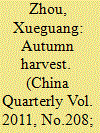

|
|
|
|
|
| Publication |
2012.
|
| Summary/Abstract |
For the peasants in rural China, the harvest season is the occasion when several different worlds - the business world of large companies, the entrepreneurial world of middlemen, local elites and peasant households - are compressed into the same social space, thereby inducing intensive economic and social interactions and crystallizing social relations among villagers, local elites and markets. Based on ethnographic research on the autumn harvest in a township in northern China, this study sheds light on distinctive modes of market transactions across produces, and diverse interactions between markets and local institutions involving different co-ordination mechanisms, rhythms and social relationships. A more nuanced image of market transactions emerges from these observations, calling for a more refined conceptualization of markets and further research on their implications for institutional changes.
|
|
|
|
|
|
|
|
|
|
|
|
|
|
|
|
| 2 |
ID:
181895
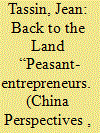

|
|
|
|
|
| Summary/Abstract |
This paper analyses the framing processes at play in the re-definition of “peasant agroecology” in contemporary China. Based on the study of “new-farmers” who have emerged in the networks of organic peasant agriculture, it interrogates the ambiguities of food ethics as the cornerstone of alternative food markets. The research explores the emergence of “peasant-entrepreneurs” (1) through the transmission of values and skills in processes of cultural heritage enhancement, (2) through the establishment of “trust” in the market relationship, and (3) through the negotiation between producers and retailers in a quality market for singular goods.
|
|
|
|
|
|
|
|
|
|
|
|
|
|
|
|
| 3 |
ID:
155759
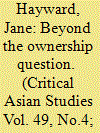

|
|
|
|
|
| Summary/Abstract |
A high-profile debate is taking place in China concerning the organization of agricultural land and production, with profound implications for China’s countryside. This debate is between those advocating for agricultural production to be taken over by large-scale agribusinesses, and those against this. Proponents regard agribusinesses as embodying modernity and progress, while those against forewarn of the channeling of profits out of peasant hands, the loss of peasants’ autonomy over labor and land, and the destruction of rural life. Recent English language publications on China’s agrarian change highlight the growing power of agribusiness and related processes of depeasantization, implying the Chinese debate on “who will till the land?” is futile. But this view obscures efforts by Chinese scholars and policymakers to promote forms of agricultural organization conducive to maintaining peasant livelihoods. By examining the Chinese debates on agribusinesses, family farms, and cooperatives, this article highlights points of contestation among policymakers and alternative possibilities, which may yet shape the course of China’s agrarian change. This article contributes to scholarship on China’s agrarian change, broader questions concerning depeasantization, and developmental possibilities under collective ownership.
|
|
|
|
|
|
|
|
|
|
|
|
|
|
|
|
| 4 |
ID:
123929
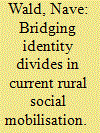

|
|
|
|
|
| Publication |
2013.
|
| Summary/Abstract |
The shift from a corporatist citizenship regime to a neoliberal one has adversely affected Latin American rural communities and led to widespread social mobilisation and organisation in the countryside. The struggle of such marginalised communities has been often framed by stressing their indigenous collective identity over the previously prevalent class-based peasant identity. This article focuses on the role of identity and the negotiation of different identities in the struggle of two rural organisations in Northwest Argentina for securing land tenure and improving their standards of living. Argentinean society, in contrast to some other Latin American societies, is often imagined as 'white,' but in recent decades many peasant, or campesino, communities have rediscovered or reaffirmed their indigenous origin. This article therefore deconstructs rural collective identities in Argentina and analyses how class and ethnic identities are negotiated in struggles of grassroots social organisations in the countryside of this predominantly urban country.
|
|
|
|
|
|
|
|
|
|
|
|
|
|
|
|
| 5 |
ID:
109978
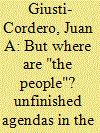

|
|
|
|
|
| Publication |
2011.
|
| Summary/Abstract |
The People of Puerto Rico is a comprehensive ethnography of major types of rural communities in pre-1950 Puerto Rico but was less successful in reconnecting those localities in a coherent portrayal of the island's social formation. A reexamination of this work's best-known subcultures, Santa Isabel (Sidney Mintz' "Cañamelar") and Ciales (Eric Wolf's "San José"), offers entry points to these communities, as well as to the key concepts that Mintz and Wolf constructed reciprocally through their research: rural proletarian and peasant, plantation and hacienda. Also present are the too-implicit spatial referents of these concepts-lowland and highland, foreland and hinterland-and their associated crop types, sugar and coffee. In this article, the historical space of Santa Isabel and Ciales will be reconsidered, in part with reference to often-overlooked nuances and caveats in Mintz' and Wolf's chapters. Foregrounding the spatial/ecological referent in "Cañamelar" and "San José" opens our sights to counterpoints between sugar and livestock, and to patterns of highland-lowland migration, kin networks, and social interaction. Familiar concepts take on new meanings as we discern supra-municipal, sub-insular, and intermediate island regions and move closer to specifying historical situations (Mintz) while renewing our theorization (Wolf).
|
|
|
|
|
|
|
|
|
|
|
|
|
|
|
|
| 6 |
ID:
180041


|
|
|
|
|
| Summary/Abstract |
The purpose of this study is to investigate and inspect the causes that prevented the (marginalised and isolated) society of Saʿid from rebelling against President Mubarak’s authoritarian regime, as the North did. Here I seek to present different interpretation of as-Saʿidiyya’s attitudes toward the 2011 uprising away from the Manichean ‘glorification’ versus ‘ignominy’, or ‘celebrating’ v. ‘contempt’ narrative that dominated the study of the Saʿid and as-Saʿidiyya role in the 2011 Arab uprising. My research is based on interviews, participant observation and ethnographic investigation which articulates the behaviour of peasants as political actors in this time of turmoil, While most sociological and anthropological studies of revolutions concentrate on cities and urban areas, this article focuses on a small town, Madinat Al-Fikriyya, and village, Munshaʿiat Al-Fikriyya in Al-Minya governate in Upper Egypt. Therefore, to understand the role of as-Saʿidiyya in the 2011 uprising, the article suggests three conceptual changes to this convention. Firstly, by putting peasantry communities within socio-political and socio-economic contexts; secondly by concentrating on understanding the dynamics of state-society relations, and lastly, exploring the role of security establishment and levels of penetration into the society in order.
|
|
|
|
|
|
|
|
|
|
|
|
|
|
|
|
| 7 |
ID:
152353
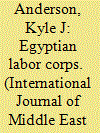

|
|
|
|
|
| Summary/Abstract |
In this article, I detail the British imperial system of human resource mobilization that recruited workers and peasants from Egypt to serve in the Egyptian Labor Corps in World War I (1914–18). By reconstructing multiple iterations of this network and analyzing the ways that workers and peasants acted within its constraints, this article provides a case study in the relationship between the Anglo-Egyptian colonial state and rural society in Egypt. Rather than seeing these as two separate, autonomous, and mutually antagonistic entities, this history of Egyptian Labor Corps recruitment demonstrates their mutual interdependence, emphasizing the dialectical relationship between state power and political subjectivity.
|
|
|
|
|
|
|
|
|
|
|
|
|
|
|
|
| 8 |
ID:
181894
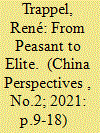

|
|
|
|
|
| Summary/Abstract |
This article contributes to the growing body of research on the role of the Party-state in shaping an emerging post-peasant modernity in rural China, taking developments in Gansu Province as a case. The article first analyses how a political preference for an agrarian elite has been put into recent policies and translates into rural practices. It argues that the “new-type agricultural management subjects,” (which form the core of this elite, should also be considered as a policy instrument designed to promote structural change in Chinese agriculture. This article proceeds to explore the capacity of the new agrarian elite as local development agents in Gansu Province. It focuses in particular on the legitimation of this instrument and its consequences for the structure of agriculture.
|
|
|
|
|
|
|
|
|
|
|
|
|
|
|
|
| 9 |
ID:
099880
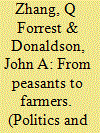

|
|
|
|
|
| Publication |
2010.
|
| Summary/Abstract |
The development of factor markets has opened Chinese agriculture for the penetration of capitalism. This new round of rural transformation-China's agrarian transition- raises the agrarian question in the Chinese context. This study investigates how capitalist forms and relations of production transform agricultural production and the peasantry class in rural China. The authors identify six forms of nonpeasant agricultural production, compare the labor regimes and direct producers' socioeconomic statuses across these forms, and evaluate the role of China's land-rights institution in shaping these forms. The empirical investigation presents three main findings: (1) Peasant differentiation : capitalist forms of agricultural production differentiate peasants into a variety of new class positions. (2) Market-based stratification: producers in capitalist agriculture are primarily stratified by their positions in labor and land markets; their socioeconomic statuses are linked with their varying degrees of proletarianization. (3) Institutional mediation: rural China's dual-track land system plays a crucial role in shaping the diverse and unique forms of capitalist production.
|
|
|
|
|
|
|
|
|
|
|
|
|
|
|
|
| 10 |
ID:
110216


|
|
|
|
|
| Publication |
2011.
|
| Summary/Abstract |
Over the years, Hanoi historians have presented different views of the role of communist organizers in the events of 1930-31. Thanks to the opening of the Comintern archives, we can now see that in 1929-30 there was a strong shift in international communism towards revolutionary violence in all parts of the world. This paper discusses the ideological precedents and influences reaching Vietnam from Russia and the Comintern, as well as from the Chinese revolutionary movement. These include the slogans and political analysis of colonial countries that the Comintern and its agents were popularizing in Moscow, Paris and China. They also include the experience of peasant revolt in southern China, in particular what became known as the Hai-lufeng Soviets in Guangdong province in 1927-28, as well as Chinese left-wing politics of 1928-30, when Li Lisan was a dominant force. The author explores the idea that violent anarchism, with roots in the theories of early Russian revolutionaries, may have been a link between these disparate influences. An examination of the attitudes expressed by different Vietnamese communist leaders towards the revolutionary violence of 1930-31 forms an important part of this paper. To what extent were they in tune with the Comintern? Did they find other sources of inspiration closer to home? Were they simply riding a wave of peasant anger? In conclusion, the author discusses conceptions of what the Revolutionary High Tide represented in terms of political change in Vietnam. Was it the coming of age of the proletariat; an expression of peasant grievances that got out of control; or a first step on the path to independence?
|
|
|
|
|
|
|
|
|
|
|
|
|
|
|
|
| 11 |
ID:
095550
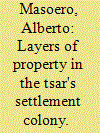

|
|
|
|
|
| Publication |
2010.
|
| Summary/Abstract |
In the 1890s the authorities in St Petersburg attributed enormous value to the introduction (nasazhdenie) of private land property in the eastern peripheral regions. It was considered an urgent task and a fundamental aspect in the overall scheme of building an empire. The article examines the preparatory materials of the 1901 law on land privatization in Siberia - in itself a failure with little practical significance - in the context of other forms of landholding and the peasant resettlement policy, within the social and spatial hierarchy of the imperial periphery. The journals of the Siberian Railroad Committee and other unpublished materials are used to highlight conceptions of individual ownership, the motivations and ideologies of the officials who endeavoured to draft the law. The debate as to who had the right to own land, and why, constantly intersected and mirrored the visions of the desired future of the eastern territories. Private property was treated as an addition to the existing social landscape and as an instrument of transformation. The search for a 'suitable' or 'enlightened' landowner represented an adaptation of the traditional social hierarchy to new conditions and new colonial duties to a large extent.
|
|
|
|
|
|
|
|
|
|
|
|
|
|
|
|
| 12 |
ID:
193040
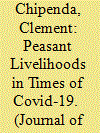

|
|
|
|
|
| Summary/Abstract |
The Covid-19 pandemic has had unprecedented global impact, creating multiple crises that have gone beyond the epidemiological, extending to the socio-economic and political. It has exposed structural flaws in global capitalism and intensified inequalities that have traditionally been imbedded in relations of production and social reproduction. In emerging Covid-19 literature, blind spots exist on its impact on peasant households. It is this knowledge gap that this article fills. Focusing on an agrarian context in rural Zimbabwe, the article employs a classical agrarian perspective and the political economy approach as conceptual and heuristic tools to explore the impact which this novel virus has had on rural livelihoods. It shows that the pandemic has impacted agricultural production, social reproduction, labour relations and asset accumulation. While its impact has been largely negative, opportunities were created with peasant agency being critical in dealing with shocks and vulnerabilities.
|
|
|
|
|
|
|
|
|
|
|
|
|
|
|
|
| 13 |
ID:
179922
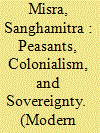

|
|
|
|
|
| Summary/Abstract |
This article studies two seismic decades in the history of the Garo community, marked out in colonial records as among the most violent and isolated people that British rule encountered in eastern and northeastern India. Through a densely knit historical narrative that hinges on an enquiry into the colonial reordering of the core elements of the regional political economy of eastern and northeastern India, it will train its focus on the figure of the rebellious Garo peasant and on the arresting display of Garo recalcitrance between 1807 and 1820. Reading a rich colonial archive closely and against the grain, the article will depart from extant historiography in its characterization of the colonial state in the early nineteenth century as well as of its relationship with ‘tribes’/‘peasants’ in eastern and northeastern India. A critique of the idea of primitive violence and the production of the ‘tribe’ under conditions of colonial modernity will occupy the latter half of the article. Here it will argue that the numerous and apparently disparate acts of headhunting, raids, plunder, and burning by the Garos on the lowlands of Bengal and Assam were in fact an assembling of the first of a series of sustained peasant rebellions in this part of colonial India—a powerful manifestation of a community's historical consciousness of the loss of its sovereign self under British rule.
|
|
|
|
|
|
|
|
|
|
|
|
|
|
|
|
| 14 |
ID:
179946
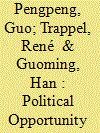

|
|
|
|
|
| Summary/Abstract |
How does "rightful resistance" take place in contemporary rural China? The continuously evolving village election system, the abolishment of the agricultural tax, and a new insistence on fighting corruption seemingly have created more space for the rural population in China to defend its rights. However, the central state's emphasis on solving the so-called three rural issues (sannong wenti 三农 问题)—raising incomes and welfare for the rural population, modernizing the countryside, and developing industrialized and modern agriculture—in a topdown manner and the continued use of "project-based management" have also greatly decreased the ability of the rural population to influence the agenda of the state and have thereby increased the potential for friction between the local state and its rural citizens. This article is a case study of a dispute between villagers and local cadres about the implementation of a reforestation project. While the case shows that villagers have several avenues for protest, it also hints at the low effectiveness of their protest and the continued existence of important structural obstacles dealing with different levels of the administration, including the atomization of villagers, the volatile nature of their interest coalition, and a profound lack of allies in society.
|
|
|
|
|
|
|
|
|
|
|
|
|
|
|
|
| 15 |
ID:
144357


|
|
|
|
|
| Summary/Abstract |
This article suggests that the prose of counter-insurgency, as defined by Ranajit Guha, serves as a theoretical yardstick against which Premchand's discourses about peasants can be measured. This is possible, however, only if Guha's scope is broadened beyond historiography to incorporate fictional as well as journalistic writings. For someone who represents the plight of the peasant with incisive historical accuracy, Premchand's implied corrective for the peasant amounts to a radical departure from the status quo in the United Provinces. In Premchand's non-fictional prose, vis-à-vis the peasant uprisings of Awadh, there are only tangential references or a studied silence; however, his fictional works reveal the rationality of peasants, despite his insistence on compassion, rectitude and integrity. Nevertheless, he never presents peasant discontent as a collective enterprise; the alternatives are provided by the writer's leap of faith, either with the zamindar (landlord) or the sarkar (government). Premchand's literary corpus thus acts as a prose of counter-insurgency that reads peasants' protests as a threat to the social order and an impediment to the nationalist movement for swaraj (self-rule), thereby either relegating it to the peripheral spaces or discarding it altogether.
|
|
|
|
|
|
|
|
|
|
|
|
|
|
|
|
| 16 |
ID:
189310
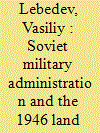

|
|
|
|
|
| Summary/Abstract |
The 1946 land reform is one of the most important events in the history of North Korea. Carried out in record time despite resistance and fierce class struggle, it abolished landlord property rights and the leasehold system, paving the way for the nationalization of industry and the construction of a socialist state. It also had great influence on South Korea, creating pressure on the US administration and the right-wing political forces it supported.
|
|
|
|
|
|
|
|
|
|
|
|
|
|
|
|
| 17 |
ID:
167089
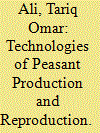

|
|
|
|
|
| Summary/Abstract |
In December 1959, the newly-constituted Pakistan Academy of Rural Development received permission to create a ‘laboratory’, that is, to conduct experiments in rural development upon peasants in Comilla, East Pakistan. This paper explores the enmeshing of post-colonial state formation and Cold War American development practices through an examination of how the Academy’s built environments, everyday practices and discourses were shaped by agricultural and contraceptive technologies. It examines how the Academy transformed a Gandhian ashram into a display and distribution centre for these technologies, and how technologies informed the Academy’s discourses on peasant religiosity and shaped peasant understandings of state and empire.
|
|
|
|
|
|
|
|
|
|
|
|
|
|
|
|
| 18 |
ID:
146398
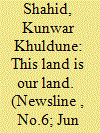

|
|
|
|
|
|
|
|